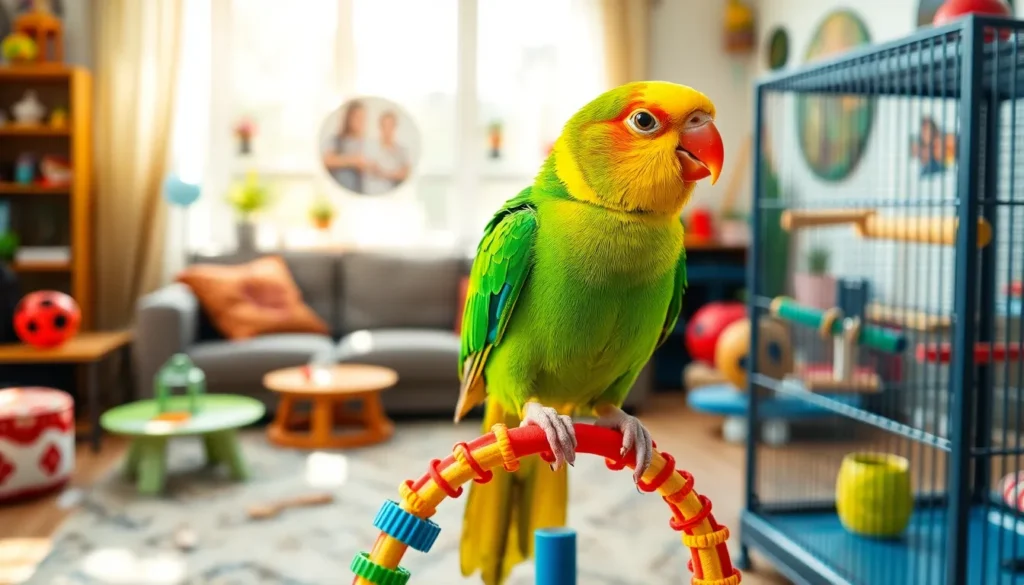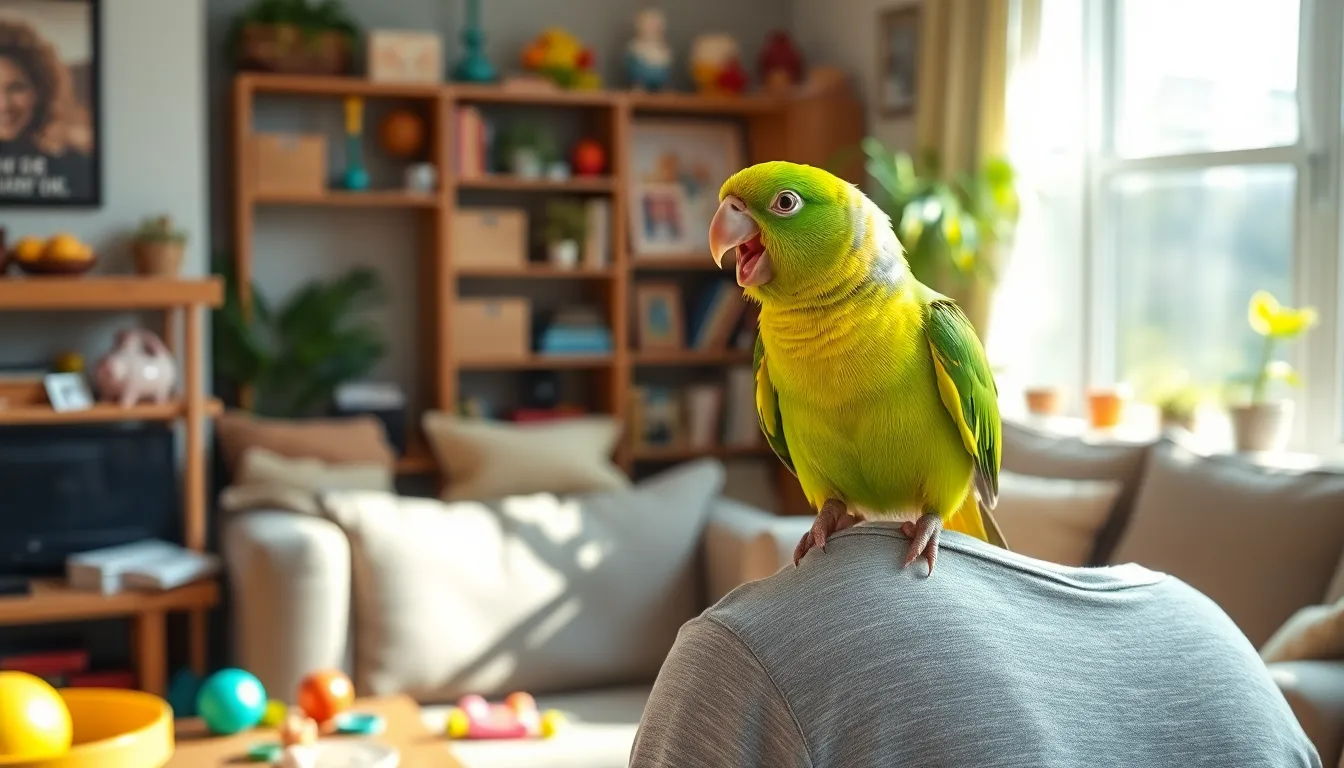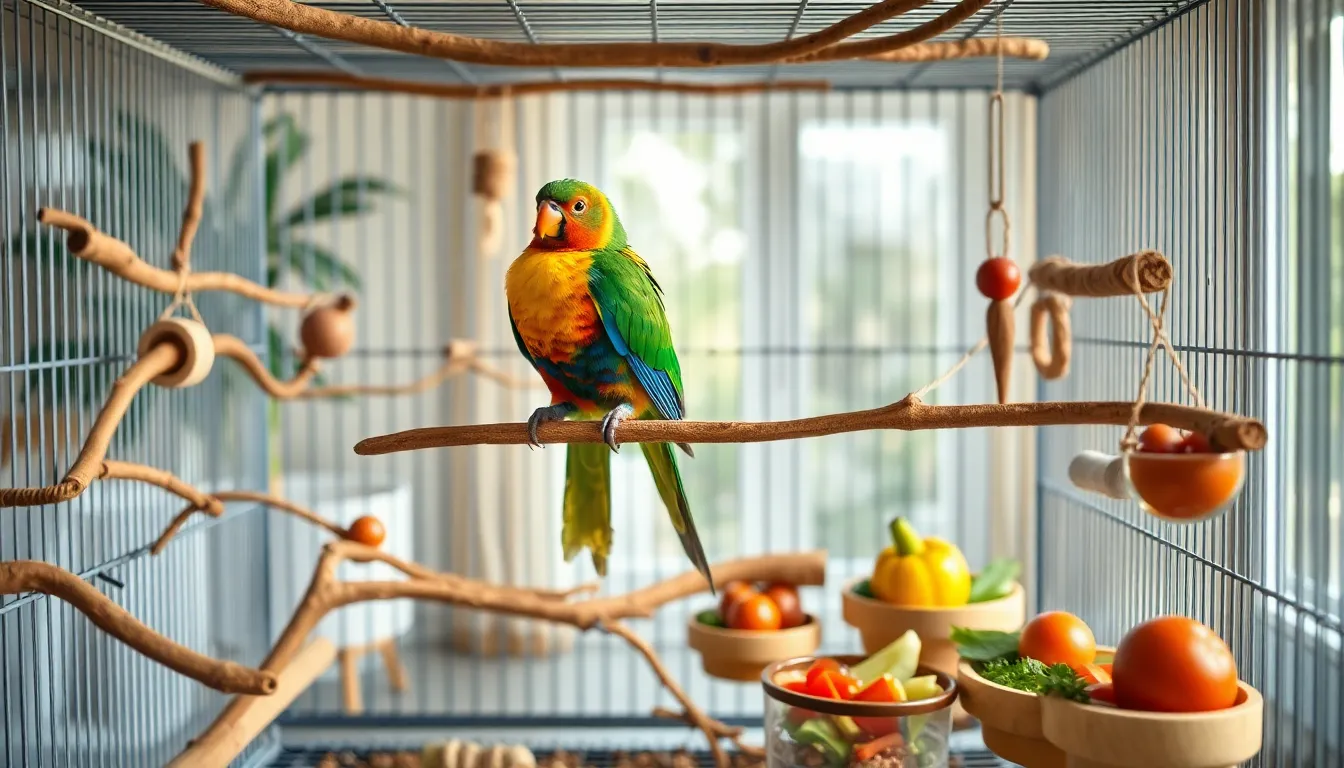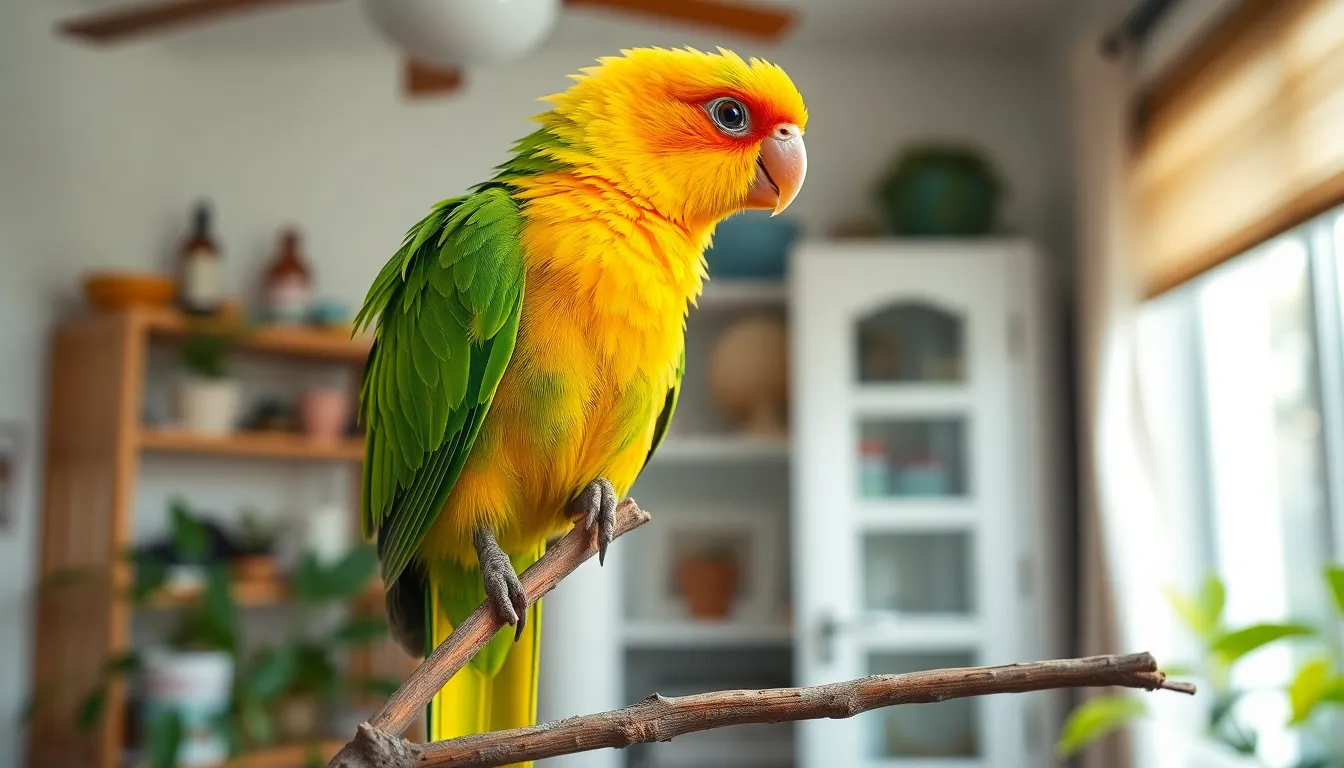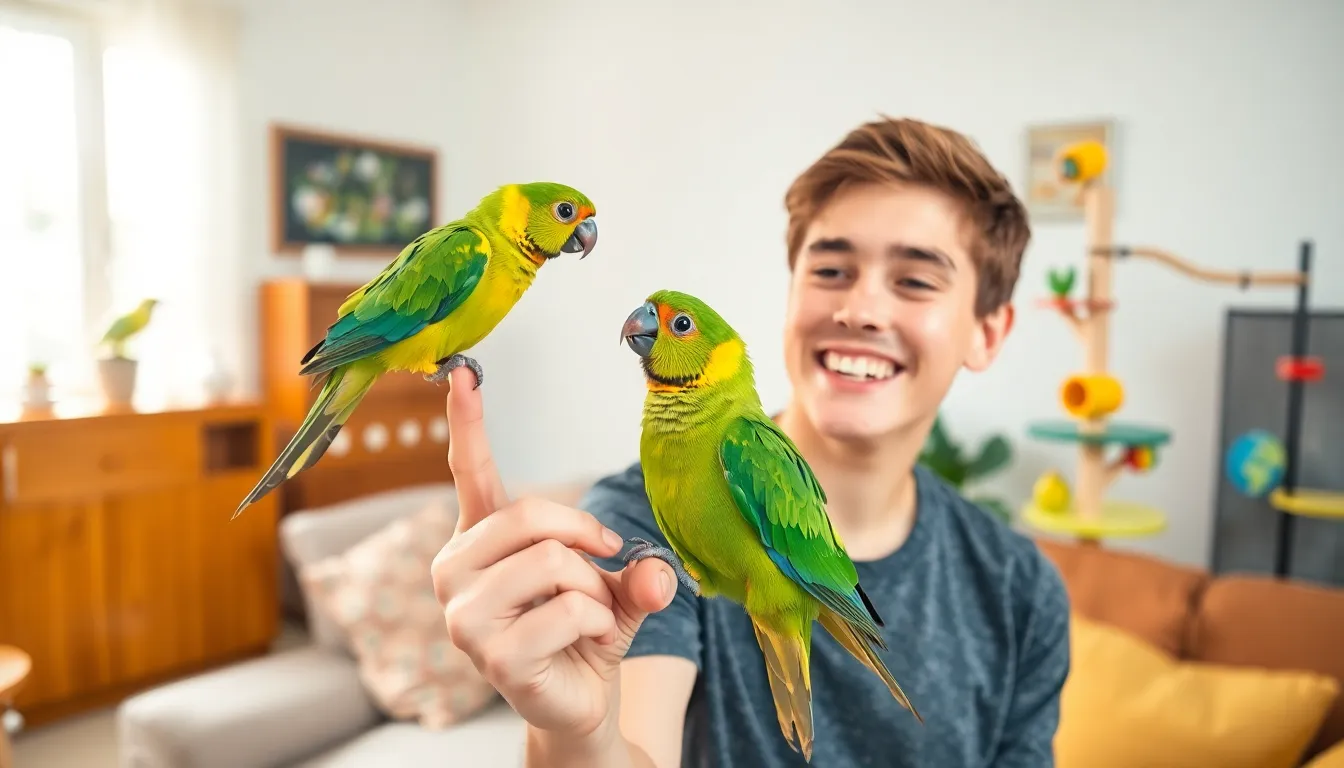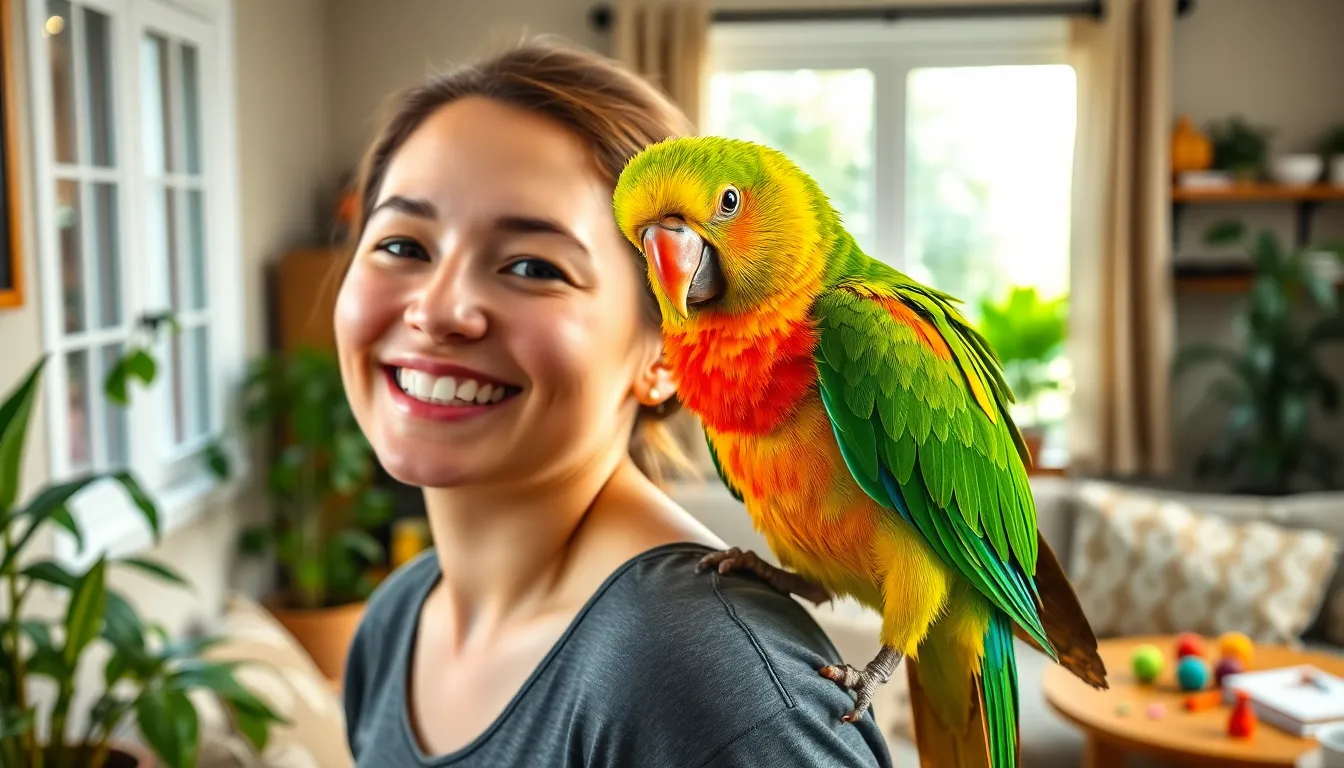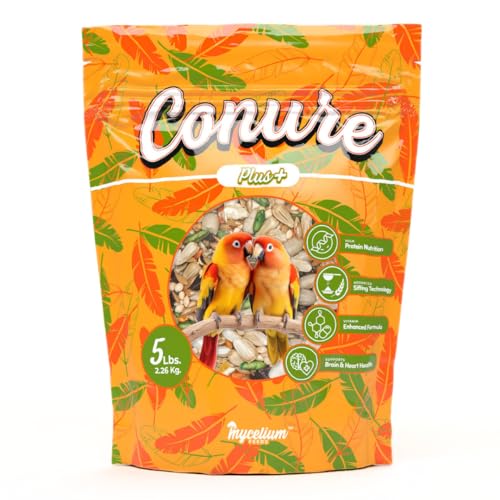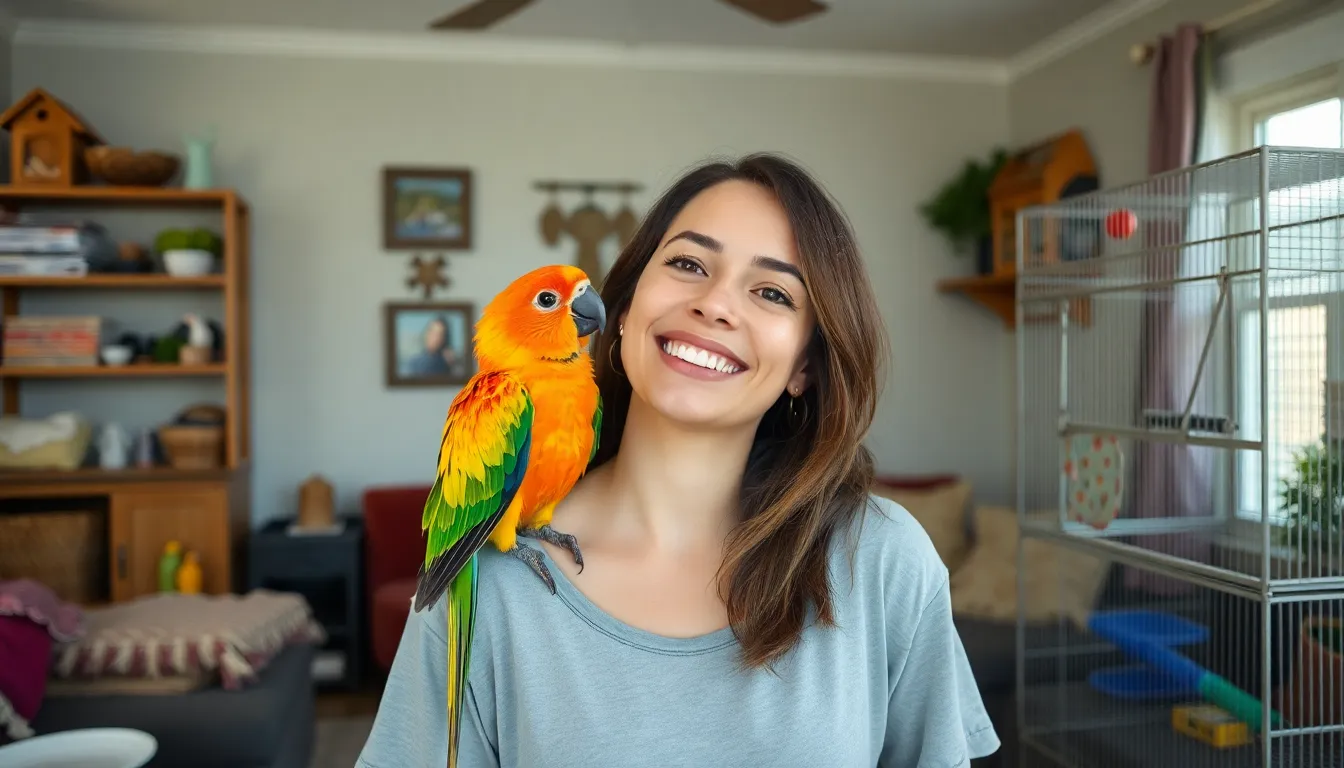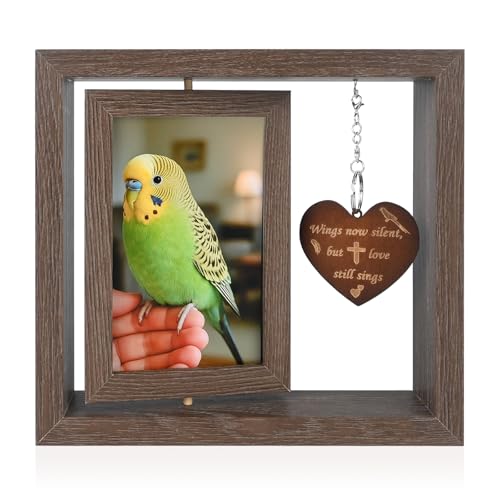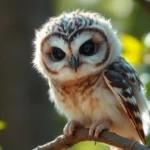We’ve all heard the cheerful chatter echoing from pet stores – that’s likely a conure bird making its presence known. These vibrant parrots have captured hearts worldwide with their playful personalities and stunning rainbow plumage that ranges from brilliant greens to fiery oranges and deep blues.
Conures aren’t just pretty faces – they’re intelligent companions that form deep bonds with their families. Whether you’re considering adding one to your home or you’re already smitten with these feathered comedians, understanding their unique needs is crucial for a thriving relationship.
From their social nature that craves interaction to their surprising ability to learn tricks and even words, conures offer an experience that’s both rewarding and entertaining. We’ll explore everything you need to know about these captivating birds, helping you decide if a conure is the perfect addition to your life.
What Is a Conure Bird?
Conures belong to the parrot family and represent one of the most diverse groups of companion birds available today. These neotropical parrots originated from Central and South America and have captured the hearts of bird enthusiasts worldwide with their distinctive features and captivating personalities.
Physical Characteristics
Conure birds typically measure between 9 and 20 inches in length depending on their species. Their compact bodies feature strong curved beaks perfectly designed for cracking seeds and manipulating objects with precision. Most conures display vibrant feather patterns that combine multiple colors including emerald green, brilliant orange, deep red, and sunny yellow.
Their zygodactyl feet contain two toes facing forward and two facing backward, giving them exceptional gripping ability for climbing and holding food. Conures possess relatively long tails that often match or complement their body coloration. Adult conures weigh between 2 and 8 ounces, with larger species like Blue Crowned Conures reaching the upper weight range.
The eyes of most conure species appear dark brown or black, though some varieties display orange or red irises as they mature. Their wings span approximately 12 to 15 inches when fully extended, enabling swift flight patterns and agile maneuvering through dense forest canopies in their natural habitats.
Species Varieties
Over 40 distinct conure species exist worldwide, each offering unique characteristics and care requirements. Sun Conures stand out with their brilliant golden yellow plumage accented by orange and red wing markings. Green Cheek Conures present a more subdued color palette featuring forest green bodies with maroon tail feathers and blue flight feathers.
Blue Crowned Conures showcase deep blue head coloring that transitions to green body feathers, making them instantly recognizable among conure enthusiasts. Cherry Headed Conures display striking red heads that contrast beautifully with their predominantly green bodies. Nanday Conures feature distinctive black heads and beaks while maintaining bright green body coloration.
Mitred Conures present red patches around their eyes and foreheads against green plumage, while Peach Fronted Conures exhibit orange peach coloring on their faces and throats. Each species varies in size, temperament, and vocal abilities, with some like the Sun Conure being notably louder than others such as the Green Cheek Conure.
| Species | Size (inches) | Weight (ounces) | Primary Colors | Noise Level |
|---|---|---|---|---|
| Sun Conure | 12 | 4-5 | Yellow, Orange, Red | High |
| Green Cheek | 10 | 2-3 | Green, Maroon, Blue | Moderate |
| Blue Crowned | 15 | 5-6 | Blue, Green | Moderate |
| Nanday | 13 | 4-5 | Black, Green | High |
| Cherry Headed | 13 | 4-5 | Red, Green | High |
Conure Bird Personality and Temperament
Conure birds exhibit distinctive personality traits that set them apart from other parrot species. These vibrant companions display complex behavioral patterns that make them both rewarding and challenging pets.
Social Nature
Conure birds thrive in social environments and form incredibly strong bonds with their human families. They demonstrate pack mentality behavior that stems from their wild flock instincts, often becoming attached to one particular family member while remaining friendly with others.
These birds require constant social interaction to maintain their emotional well-being. Loneliness can trigger destructive behaviors including excessive screaming, feather plucking, and aggression toward family members. Conures communicate through various vocalizations, body language cues like head bobbing, and physical contact such as preening their owners.
Social conures enjoy participating in daily household activities and often demand attention when family members gather together. They express jealousy when their favorite person interacts with other pets or family members, displaying territorial behaviors that include loud calling and physical positioning between their owner and perceived competition.
Intelligence and Playfulness
Conure birds possess remarkable cognitive abilities that rival those of young children aged 3 to 5 years old. They demonstrate problem-solving skills through puzzle toy manipulation, food foraging behaviors, and escape artistry that challenges even experienced bird owners.
These intelligent birds learn vocabulary words, phrases, and commands through repetition and positive reinforcement training methods. Green Cheek Conures typically master 10 to 20 words, while Sun Conures can learn up to 30 distinct phrases with consistent practice sessions lasting 15 to 20 minutes daily.
Playful conures engage in acrobatic behaviors including hanging upside down, swinging from cage bars, and performing somersaults during active play periods. They manipulate objects with their beaks and feet, creating games from household items like bottle caps, paper strips, and cardboard tubes. These birds require 2 to 3 hours of supervised playtime outside their cages to satisfy their exercise needs and prevent boredom related behavioral issues.
Caring for Your Conure Bird
Conure care involves creating an environment that supports their physical health and psychological well-being. We’ve developed comprehensive guidelines to help you provide optimal care for these intelligent, social companions.
Housing Requirements
Cage dimensions play a critical role in conure health, with minimum requirements of 24 inches wide by 24 inches deep by 30 inches tall for smaller species like Green Cheek Conures. Larger species such as Sun Conures require cages measuring at least 36 inches wide by 24 inches deep by 36 inches tall.
Bar spacing maintains safety and prevents injury, with recommended measurements between 5/8 to 3/4 inches for most conure species. Horizontal bars provide climbing opportunities that match their natural behaviors, while powder-coated or stainless steel materials resist damage from their powerful beaks.
Perch variety supports foot health through different diameters and textures, including natural wood branches, rope perches, and mineral perches. We recommend installing 3 to 4 perches at varying heights to encourage movement throughout the cage space.
Temperature control keeps conures comfortable between 65°F and 80°F, avoiding drafts and sudden temperature changes that stress their respiratory systems. Humidity levels between 50% and 60% prevent dry skin and respiratory issues common in indoor environments.
Location selection places the cage in areas with natural light cycles while avoiding kitchens, where cooking fumes pose serious health risks to birds’ sensitive respiratory systems.
Diet and Nutrition
Pellet foundations form the cornerstone of conure nutrition, comprising 75% to 80% of their daily food intake. High-quality pellets contain balanced vitamins, minerals, and proteins specifically formulated for medium-sized parrots.
Fresh vegetables provide essential nutrients and variety, with dark leafy greens like kale, spinach, and collard greens offering calcium and vitamin A. Orange vegetables such as carrots, sweet potatoes, and bell peppers deliver beta-carotene crucial for immune system function.
Fruit portions remain limited to 10% of total diet due to high sugar content, with safe options including apples, berries, and melons served 2 to 3 times per week. We remove seeds from fruits like apples and cherries, as they contain compounds toxic to birds.
Seed mixes supplement rather than replace pellets, offering variety and foraging opportunities when provided in small quantities. Sunflower seeds and nuts serve as training treats rather than dietary staples due to their high fat content.
Water changes occur daily using filtered or bottled water to prevent bacterial growth and ensure hydration. Stainless steel or ceramic bowls resist bacterial accumulation better than plastic alternatives.
Exercise and Enrichment
Daily flight time outside the cage provides essential exercise for conures, requiring supervised sessions of 2 to 4 hours in bird-proofed rooms. We remove ceiling fans, close windows, and secure other pets before allowing free flight.
Foraging activities stimulate natural behaviors through puzzle feeders, paper cups filled with treats, and food hidden throughout the cage. These activities occupy conures for extended periods while providing mental stimulation that prevents behavioral issues.
Toy rotation maintains interest and prevents boredom, with recommendations to change 2 to 3 toys weekly from a collection of 8 to 10 different options. Safe materials include untreated wood, vegetable-tanned leather, and stainless steel components.
Social interaction meets conures’ psychological needs through daily training sessions, games, and conversation that strengthen human-bird bonds. Interactive play includes teaching tricks, practicing step-up commands, and captivating in gentle physical contact like head scratches.
Climbing structures both inside and outside the cage encourage natural behaviors, with play gyms, ladders, and rope bridges providing varied exercise opportunities that maintain physical fitness and coordination.
Health Considerations for Conure Birds
Conure birds face exact health challenges that require proactive monitoring and preventive care. Understanding these health considerations ensures we can provide the best possible care for our feathered companions.
Common Health Issues
Conures experience several recurring health problems that affect their quality of life and longevity. Feather plucking represents one of the most concerning behavioral health issues, often resulting from stress, boredom, or underlying medical conditions.
Respiratory infections occur frequently in conures, particularly when exposed to drafts, temperature fluctuations, or poor air quality. Signs include labored breathing, tail bobbing, and discharge from the nostrils or eyes.
Nutritional deficiencies manifest through various symptoms:
- Vitamin A deficiency causes respiratory issues and poor feather quality
- Calcium deficiency leads to egg binding in females and seizures
- Iron deficiency results in lethargy and pale mucous membranes
Psittacine Beak and Feather Disease (PBFD) poses a serious viral threat to conures, causing abnormal feather development and beak deformities. This highly contagious disease spreads through feather dust and droppings.
Bacterial infections commonly affect the digestive system, often stemming from contaminated food or water sources. Symptoms include changes in droppings, decreased appetite, and lethargy.
Common parasitic infections include:
- Giardia affecting the intestinal tract
- External mites causing skin irritation
- Internal worms leading to weight loss
Hormonal disorders frequently develop in mature conures, particularly chronic egg laying in females and aggressive territorial behavior in males during breeding season.
Veterinary Care
Establishing a relationship with an avian veterinarian ensures proper health management for conure birds. Annual wellness examinations catch potential problems before they become serious health issues.
Essential veterinary procedures include:
- Complete blood count and chemistry panel
- Fecal parasite examination
- Weight monitoring and body condition assessment
- Beak and nail trimming when necessary
Emergency veterinary care becomes critical when conures display sudden behavioral changes, breathing difficulties, or bleeding. Birds hide illness instinctively, making early detection challenging but essential for successful treatment.
Quarantine protocols protect existing birds when introducing new conures to multi bird households. We recommend a minimum 30 day quarantine period with separate air circulation systems.
Preventive health measures reduce disease risk:
- Regular cleaning and disinfection of cages and accessories
- Proper food storage to prevent bacterial contamination
- Maintaining optimal temperature ranges between 65°F and 80°F
- Providing adequate humidity levels around 50% to 60%
Laboratory testing helps diagnose exact conditions through blood work, bacterial cultures, and DNA testing for genetic diseases. Many conure health problems respond well to early intervention when detected through routine testing.
Vaccination protocols vary by region but may include protection against Polyomavirus and other relevant diseases based on local risk factors and veterinary recommendations.
Training Your Conure Bird
Training conure birds becomes essential for developing their remarkable intelligence while strengthening the human-bird bond. Positive reinforcement methods work most effectively with these intelligent parrots who possess learning capabilities comparable to young children.
Basic Commands
Step-up command forms the foundation of conure bird training and establishes trust between you and your feathered companion. Place your finger horizontally in front of your conure’s lower chest area and say “step up” in a calm voice. Reward compliance immediately with verbal praise or a small healthy treat like a sunflower seed.
Stay command teaches conures impulse control and prevents unwanted behaviors during training sessions. Hold your palm facing your bird while saying “stay” and gradually increase the duration from 5 seconds to 30 seconds. Practice this command during meal times when your conure shows high motivation for food rewards.
Come command develops recall abilities essential for safe out-of-cage time with your conure bird. Start training in a small room with minimal distractions and use high-value treats like pine nuts or dried fruit pieces. Call your conure’s name followed by “come” while showing the reward at eye level.
Target training engages your conure’s natural curiosity and provides mental stimulation during training sessions. Use a chopstick or target stick and reward your bird when they touch the stick with their beak. Gradually introduce the verbal cue “touch” while presenting the target stick at different distances.
Socialization Tips
Early exposure to various people helps prevent one-person bonding issues common in conure birds. Introduce your conure to family members and trusted friends during their first 6 months in your home. Allow different people to offer treats and interact with your bird for 10-15 minute sessions.
Environmental enrichment prepares conures for new experiences and reduces stress-related behaviors. Rotate toys weekly including foraging puzzles, shreddable materials, and climbing structures. Introduce new perching materials like natural wood branches with bark intact to simulate wild conditions.
Positive handling experiences build confidence in your conure bird and make veterinary visits less stressful. Practice gentle wing examinations and beak inspections during calm moments. Touch your conure’s feet regularly to prepare them for potential nail trimming procedures.
Sound desensitization helps conures adapt to household noises without developing fear responses. Gradually introduce sounds like vacuum cleaners, doorbells, and kitchen appliances at low volumes. Pair each new sound with favorite treats to create positive associations with potentially startling noises.
Flight training in secure environments allows conures to exercise their natural behaviors while maintaining safety. Practice recall commands in a bird-proofed room before attempting outdoor flight training with proper harnesses. Supervise all flight sessions and remove potential hazards like ceiling fans or open windows.
Pros and Cons of Owning a Conure Bird
Advantages of Conure Bird Ownership
Social Connection and Companionship
Conures develop deep emotional bonds with their human families that last for decades. These intelligent birds recognize individual family members and display distinct preferences for exact people. Affectionate behaviors include head nods, gentle nibbling, and seeking physical contact through perching on shoulders or hands.
Entertainment Value and Personality
Playful antics and acrobatic displays provide daily entertainment for conure owners. These birds perform hanging upside down from perches, play peek-a-boo games, and engage in curious exploration of their environment. Interactive behaviors like dancing to music and responding to conversations create captivating household dynamics.
Learning Capabilities and Intelligence
Vocabulary acquisition ranges from 20 to 100 words depending on the species and individual bird. Training success includes learning complex tricks, following multi-step commands, and problem-solving activities. Cognitive abilities comparable to 3-year-old children enable conures to understand routines, recognize objects, and respond to emotional cues.
Manageable Size and Care Requirements
Medium-sized dimensions between 9 and 20 inches make conures suitable for various living spaces. Housing requirements include cages measuring 24x24x30 inches minimum, significantly smaller than macaw accommodations. Grooming needs remain minimal with occasional nail trims and wing clipping performed by professionals.
Challenges of Conure Bird Ownership
Noise Levels and Vocalization Patterns
Contact calls reach 120 decibels, equivalent to chainsaw noise levels during peak activity periods. Morning and evening vocalizations occur consistently regardless of household schedules or neighbor proximity. Sun Conures produce the loudest calls among conure species, while Green Cheek Conures maintain relatively moderate volume levels.
Time Commitment and Social Demands
Daily interaction requirements include 4 to 6 hours of supervised out-of-cage time for optimal psychological health. Attention seeking behaviors escalate into screaming, feather plucking, or aggression when social needs aren’t met consistently. Long-term commitment spans 20 to 30 years, requiring lifestyle adjustments throughout multiple life stages.
Destructive Behaviors and Property Damage
Chewing instincts target wooden furniture, electrical cords, and household items within reach. Beak strength enables conures to damage expensive electronics, books, and decorative objects during unsupervised exploration. Monthly toy replacement costs range from $20 to $50 to satisfy their destructive play needs safely.
Financial Investment and Ongoing Expenses
Initial setup costs including cage, perches, and toys range from $300 to $800 for quality equipment. Monthly food expenses average $25 to $40 for pellets, fresh produce, and treats. Veterinary care from avian specialists costs $150 to $300 per annual wellness examination, with emergency visits reaching $500 to $1,500.
Specialized Care Requirements
Temperature sensitivity requires maintaining environments between 65°F and 80°F year-round. Diet complexity involves providing 14 different vegetable types weekly alongside high-quality pellets. Cleaning schedules include daily cage maintenance, weekly deep cleaning, and monthly disinfection to prevent bacterial infections.
Is a Conure Bird Right for You?
Deciding on conure ownership requires honest evaluation of your lifestyle, living situation, and commitment level. These vibrant parrots demand important daily attention, often requiring 4-6 hours of social interaction outside their cage each day.
Lifestyle Considerations
Your daily schedule determines whether you can meet a conure’s social needs. Working professionals who spend 8+ hours away from home often struggle to provide adequate interaction. Conures develop separation anxiety when left alone for extended periods, leading to destructive behaviors like feather plucking and excessive screaming.
Noise tolerance becomes crucial since conures vocalize loudly during dawn and dusk hours. Apartment dwellers frequently face complaints from neighbors due to contact calls that can reach 120 decibels. Suburban homes with understanding neighbors provide better environments for these naturally vocal birds.
Financial Investment Requirements
Conure ownership involves substantial upfront and ongoing costs that extend far beyond the initial purchase price:
| Expense Category | Initial Cost | Monthly Cost |
|---|---|---|
| Bird Purchase | $200-$800 | – |
| Cage Setup | $300-$600 | – |
| Veterinary Care | $150-$300 | $25-$50 |
| Food & Treats | $50-$100 | $30-$50 |
| Toys & Enrichment | $100-$200 | $20-$40 |
Emergency veterinary bills can exceed $1,000 for serious conditions like crop stasis or heavy metal poisoning. Quality pellets cost $15-$25 per bag, while fresh produce adds another $20-$30 monthly to your grocery budget.
Space and Housing Demands
Your living space must accommodate a large flight cage measuring at least 36″ x 24″ x 48″ for medium conures. Small apartments often lack sufficient room for proper cage placement away from kitchens, where cooking fumes pose deadly threats to sensitive avian respiratory systems.
Conures require supervised flight time in bird-proofed rooms free from ceiling fans, open windows, and toxic plants like avocado trees. Creating safe play areas demands removing potential hazards and installing protective barriers around dangerous items.
Long Term Commitment Factors
Conures live 20-30 years with proper care, creating a decades-long commitment that spans major life changes. College students, young professionals, and growing families often underestimate how pet ownership affects career moves, relationships, and housing decisions.
Travel becomes complicated since conures can’t be left alone for more than 8-10 hours. Finding qualified pet sitters familiar with avian behavior proves challenging and expensive, often costing $50-$75 per day.
Household Compatibility
Multi-pet households require careful consideration of species interactions. Cats and dogs possess natural hunting instincts that make them dangerous around small parrots, even during supervised encounters. Young children under 8 years old may struggle with gentle handling techniques necessary for these delicate birds.
Conures thrive in calm environments where they can establish predictable routines. Chaotic households with frequent loud noises, visitors, or schedule changes often stress these sensitive creatures, leading to behavioral problems and health issues.
Experience Level Assessment
First-time bird owners often find conures overwhelming due to their complex behavioral needs and high maintenance requirements. These intelligent parrots require consistent training, environmental enrichment, and specialized veterinary care that differs significantly from traditional pet medicine.
Previous experience with smaller birds like budgerigars doesn’t adequately prepare owners for conure-exact challenges. Their stronger beaks inflict more serious bites, while their advanced intelligence demands more sophisticated enrichment activities and training techniques.
Conclusion
Conures represent one of the most rewarding yet demanding companion birds you can welcome into your home. Their vibrant personalities intelligence and capacity for deep emotional connections make them extraordinary pets for the right families.
We’ve explored everything from their diverse species and complex care requirements to the important commitment they demand. These remarkable birds aren’t suitable for everyone but for those prepared to meet their needs they offer years of joy and companionship.
Before bringing a conure home honestly assess your lifestyle living situation and long-term commitment. Remember that these intelligent creatures can live for decades and deserve owners who understand their specialized requirements.
With proper preparation knowledge and dedication you’ll discover why conures have captured the hearts of bird enthusiasts worldwide.
Frequently Asked Questions
What are conure birds and where do they come from?
Conures are vibrant, intelligent birds belonging to the parrot family and are one of the most diverse groups of companion birds. They originate from Central and South America and typically measure between 9 and 20 inches in length. With over 40 distinct species, conures are known for their strong curved beaks, colorful feather patterns, and zygodactyl feet that provide excellent gripping ability.
What makes conures good pets?
Conures make excellent pets due to their playful personalities, vibrant colors, and remarkable intelligence comparable to young children. They form deep emotional bonds with their human families and can learn vocabulary, tricks, and commands through positive reinforcement. Their entertaining, acrobatic behaviors and ability to engage in interactive play make them rewarding companions for dedicated owners.
How much space do conures need?
Conures require spacious cages with specific dimensions, appropriate bar spacing, and variety in perch types to ensure safety and comfort. They also need daily supervised playtime outside their cages for flight exercise and exploration. The cage should be large enough to allow wing stretching and accommodate toys, food dishes, and multiple perches of varying sizes and textures.
What do conures eat?
Conures thrive on a balanced diet consisting primarily of high-quality pellets, fresh vegetables, and limited amounts of fruit. Daily water changes are essential for their health. Avoid feeding them toxic foods and ensure proper food storage to prevent spoilage. A varied diet with appropriate nutritional balance is crucial for maintaining their vibrant feathers and overall health.
Are conures noisy birds?
Yes, conures are known for their high noise levels and communicate through various vocalizations. They can be particularly vocal during morning and evening hours, which potential owners must consider, especially in apartments or close living quarters. Their noise level varies by species, with some being louder than others, but all conures require understanding neighbors and noise-tolerant households.
What health problems do conures face?
Common health issues in conures include feather plucking, respiratory infections, nutritional deficiencies, and serious diseases like Psittacine Beak and Feather Disease (PBFD). Regular veterinary care with an avian specialist, annual wellness examinations, proper cage cleaning, optimal living conditions, and preventive health measures are essential for maintaining their well-being and catching potential problems early.
How much time do conures need daily?
Conures require significant daily time commitment, including several hours of social interaction, supervised playtime outside their cage, training sessions, and enrichment activities. They thrive on constant interaction with their human families and can develop destructive behaviors if left alone for extended periods. Loneliness can severely impact their emotional well-being and lead to behavioral problems.
Are conures suitable for beginners?
Conures can be challenging for beginners due to their complex behavioral patterns, high social needs, noise levels, and specialized care requirements. They require experienced handling, understanding of their body language, consistent training, and knowledge of their dietary and environmental needs. Potential owners should honestly evaluate their lifestyle, commitment level, and experience with birds before choosing a conure.
How long do conures live?
Conures are long-term companions that can live for many years, making ownership a significant commitment. Their lifespan varies by species, but most conures live well into their teens or longer with proper care. This longevity requires owners to consider their ability to provide consistent care, financial support, and companionship throughout the bird’s entire lifetime.
What are the main challenges of conure ownership?
The main challenges include managing their high noise levels, meeting their extensive social interaction needs, preventing destructive behaviors when bored or lonely, and the significant financial investment in proper housing, diet, toys, and veterinary care. Additionally, conures are temperature sensitive, require complex dietary management, and need household compatibility with their vocalizations and activity levels.

